RESE1171 - How Behaviourism Shaped Psychology as Empirical Science
VerifiedAdded on 2023/06/17
|7
|2014
|307
Essay
AI Summary
This essay explores the significant role of behaviourism in establishing psychology as an empirical science during the 19th and 20th centuries. It begins by highlighting the foundational work of Wilhelm Wundt and William James, then delves into the emergence of behaviourism, particularly the contributions of Ivan Pavlov, John Watson, and B.F. Skinner. The essay discusses classical and operant conditioning, emphasizing the shift from studying conscious experiences to observable behaviours. It critically evaluates the strengths and weaknesses of behaviourism, acknowledging its impact on therapeutic techniques while also addressing criticisms regarding its limited scope and neglect of internal mental processes. The essay concludes that behaviourism, despite its limitations, played a vital role in shaping psychology into a systematic and objective scientific discipline, with lasting influence on understanding and modifying human behaviour. Desklib provides access to this and other solved assignments.
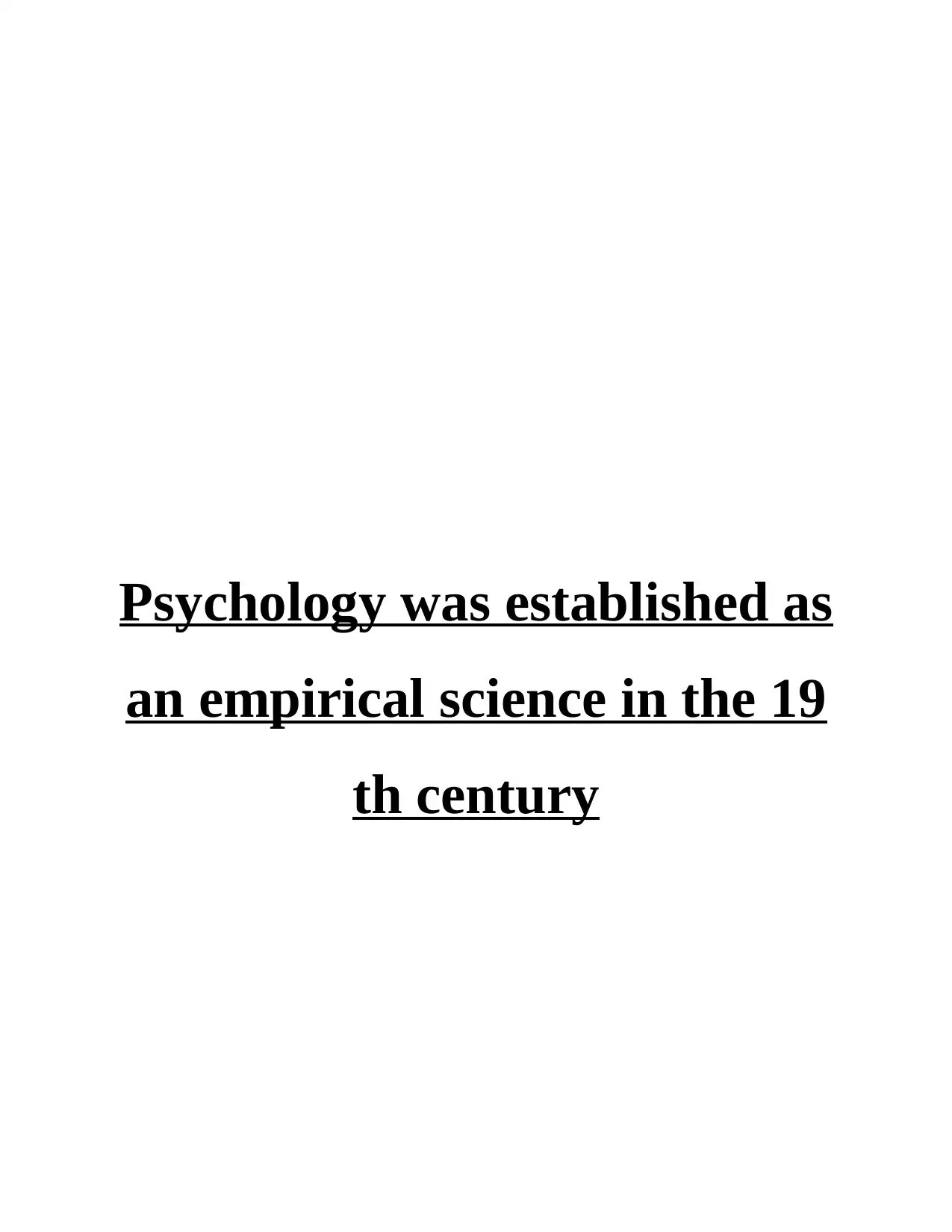
Psychology was established as
an empirical science in the 19
th century
an empirical science in the 19
th century
Paraphrase This Document
Need a fresh take? Get an instant paraphrase of this document with our AI Paraphraser

Table of Contents
REFERENCES................................................................................................................................1
REFERENCES................................................................................................................................1
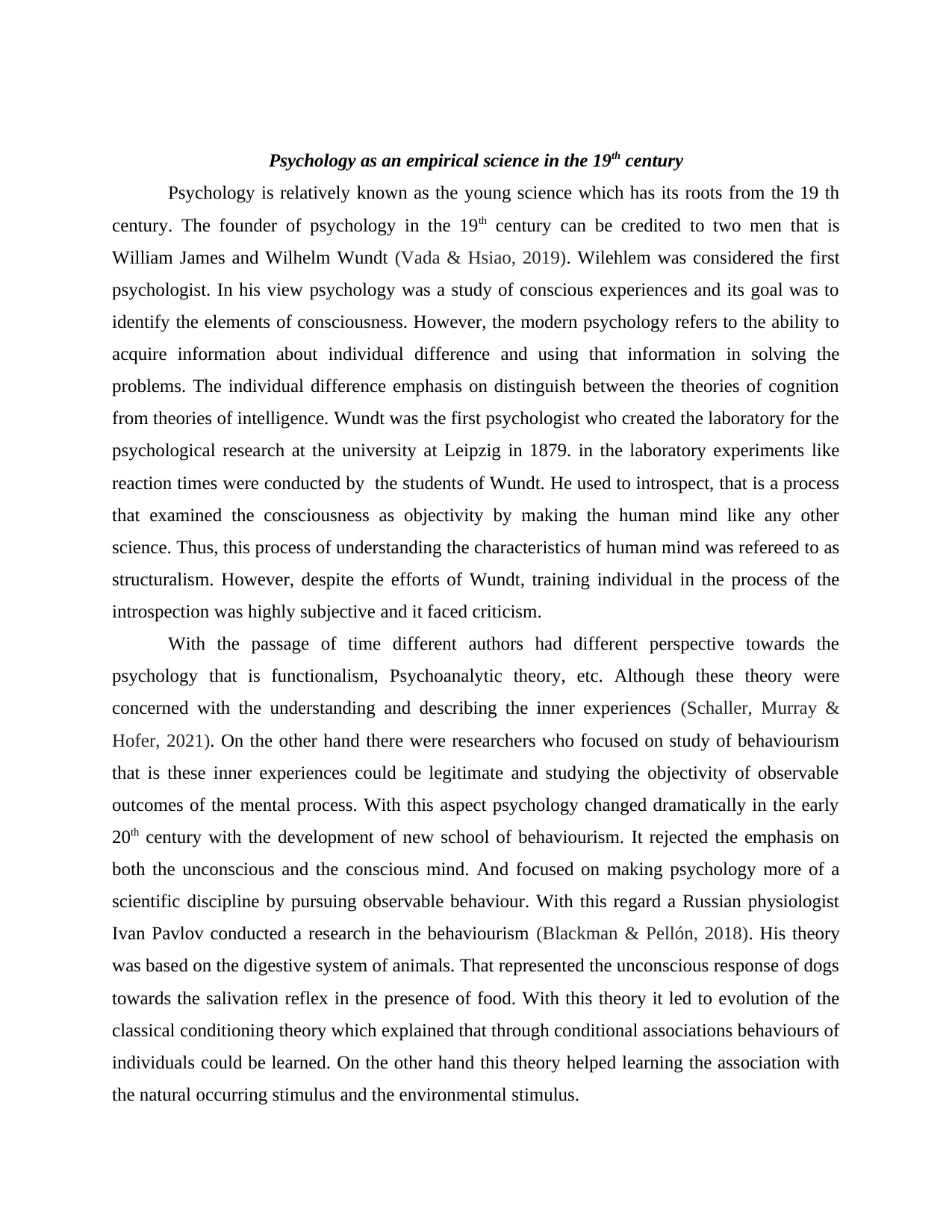
Psychology as an empirical science in the 19th century
Psychology is relatively known as the young science which has its roots from the 19 th
century. The founder of psychology in the 19th century can be credited to two men that is
William James and Wilhelm Wundt (Vada & Hsiao, 2019). Wilehlem was considered the first
psychologist. In his view psychology was a study of conscious experiences and its goal was to
identify the elements of consciousness. However, the modern psychology refers to the ability to
acquire information about individual difference and using that information in solving the
problems. The individual difference emphasis on distinguish between the theories of cognition
from theories of intelligence. Wundt was the first psychologist who created the laboratory for the
psychological research at the university at Leipzig in 1879. in the laboratory experiments like
reaction times were conducted by the students of Wundt. He used to introspect, that is a process
that examined the consciousness as objectivity by making the human mind like any other
science. Thus, this process of understanding the characteristics of human mind was refereed to as
structuralism. However, despite the efforts of Wundt, training individual in the process of the
introspection was highly subjective and it faced criticism.
With the passage of time different authors had different perspective towards the
psychology that is functionalism, Psychoanalytic theory, etc. Although these theory were
concerned with the understanding and describing the inner experiences (Schaller, Murray &
Hofer, 2021). On the other hand there were researchers who focused on study of behaviourism
that is these inner experiences could be legitimate and studying the objectivity of observable
outcomes of the mental process. With this aspect psychology changed dramatically in the early
20th century with the development of new school of behaviourism. It rejected the emphasis on
both the unconscious and the conscious mind. And focused on making psychology more of a
scientific discipline by pursuing observable behaviour. With this regard a Russian physiologist
Ivan Pavlov conducted a research in the behaviourism (Blackman & Pellón, 2018). His theory
was based on the digestive system of animals. That represented the unconscious response of dogs
towards the salivation reflex in the presence of food. With this theory it led to evolution of the
classical conditioning theory which explained that through conditional associations behaviours of
individuals could be learned. On the other hand this theory helped learning the association with
the natural occurring stimulus and the environmental stimulus.
Psychology is relatively known as the young science which has its roots from the 19 th
century. The founder of psychology in the 19th century can be credited to two men that is
William James and Wilhelm Wundt (Vada & Hsiao, 2019). Wilehlem was considered the first
psychologist. In his view psychology was a study of conscious experiences and its goal was to
identify the elements of consciousness. However, the modern psychology refers to the ability to
acquire information about individual difference and using that information in solving the
problems. The individual difference emphasis on distinguish between the theories of cognition
from theories of intelligence. Wundt was the first psychologist who created the laboratory for the
psychological research at the university at Leipzig in 1879. in the laboratory experiments like
reaction times were conducted by the students of Wundt. He used to introspect, that is a process
that examined the consciousness as objectivity by making the human mind like any other
science. Thus, this process of understanding the characteristics of human mind was refereed to as
structuralism. However, despite the efforts of Wundt, training individual in the process of the
introspection was highly subjective and it faced criticism.
With the passage of time different authors had different perspective towards the
psychology that is functionalism, Psychoanalytic theory, etc. Although these theory were
concerned with the understanding and describing the inner experiences (Schaller, Murray &
Hofer, 2021). On the other hand there were researchers who focused on study of behaviourism
that is these inner experiences could be legitimate and studying the objectivity of observable
outcomes of the mental process. With this aspect psychology changed dramatically in the early
20th century with the development of new school of behaviourism. It rejected the emphasis on
both the unconscious and the conscious mind. And focused on making psychology more of a
scientific discipline by pursuing observable behaviour. With this regard a Russian physiologist
Ivan Pavlov conducted a research in the behaviourism (Blackman & Pellón, 2018). His theory
was based on the digestive system of animals. That represented the unconscious response of dogs
towards the salivation reflex in the presence of food. With this theory it led to evolution of the
classical conditioning theory which explained that through conditional associations behaviours of
individuals could be learned. On the other hand this theory helped learning the association with
the natural occurring stimulus and the environmental stimulus.
⊘ This is a preview!⊘
Do you want full access?
Subscribe today to unlock all pages.

Trusted by 1+ million students worldwide
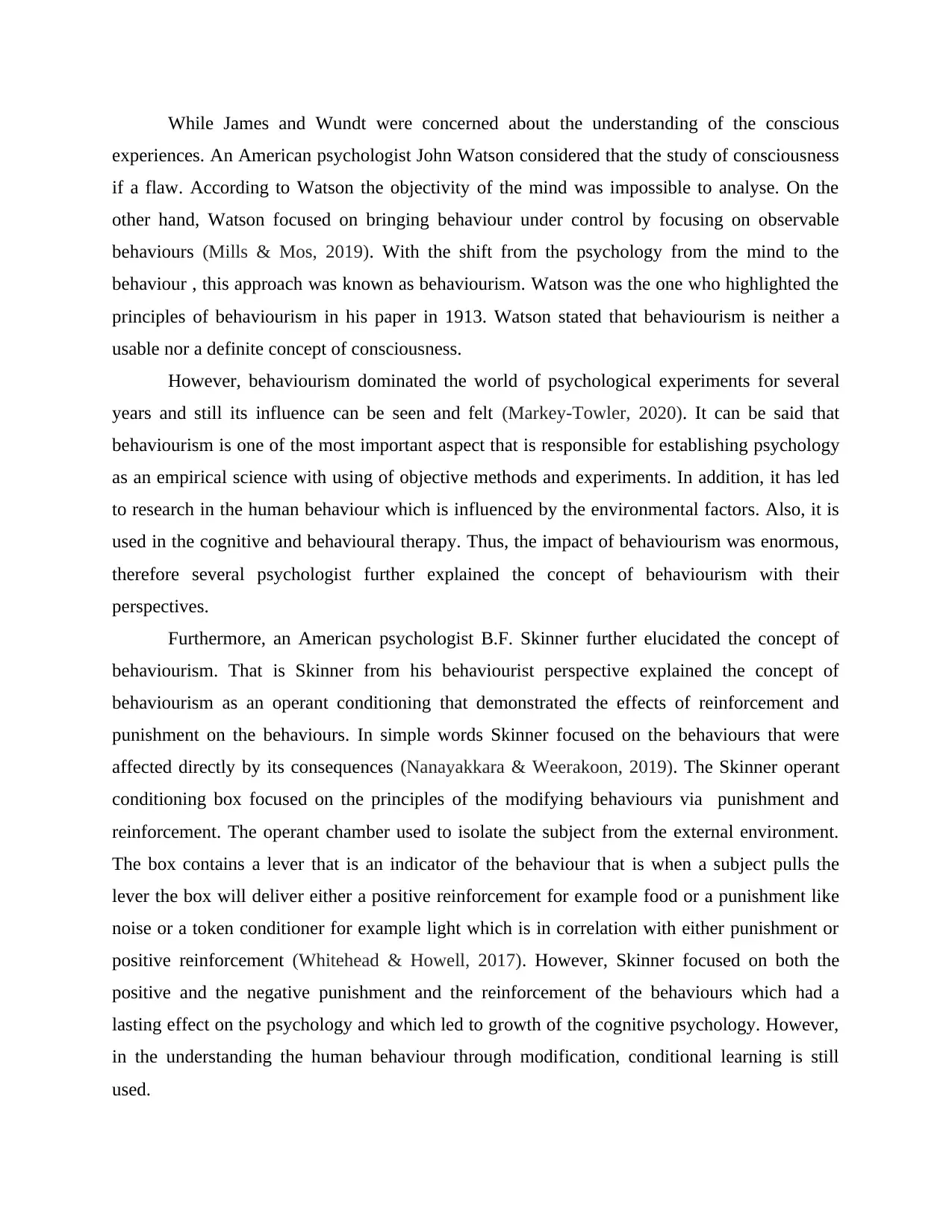
While James and Wundt were concerned about the understanding of the conscious
experiences. An American psychologist John Watson considered that the study of consciousness
if a flaw. According to Watson the objectivity of the mind was impossible to analyse. On the
other hand, Watson focused on bringing behaviour under control by focusing on observable
behaviours (Mills & Mos, 2019). With the shift from the psychology from the mind to the
behaviour , this approach was known as behaviourism. Watson was the one who highlighted the
principles of behaviourism in his paper in 1913. Watson stated that behaviourism is neither a
usable nor a definite concept of consciousness.
However, behaviourism dominated the world of psychological experiments for several
years and still its influence can be seen and felt (Markey‐Towler, 2020). It can be said that
behaviourism is one of the most important aspect that is responsible for establishing psychology
as an empirical science with using of objective methods and experiments. In addition, it has led
to research in the human behaviour which is influenced by the environmental factors. Also, it is
used in the cognitive and behavioural therapy. Thus, the impact of behaviourism was enormous,
therefore several psychologist further explained the concept of behaviourism with their
perspectives.
Furthermore, an American psychologist B.F. Skinner further elucidated the concept of
behaviourism. That is Skinner from his behaviourist perspective explained the concept of
behaviourism as an operant conditioning that demonstrated the effects of reinforcement and
punishment on the behaviours. In simple words Skinner focused on the behaviours that were
affected directly by its consequences (Nanayakkara & Weerakoon, 2019). The Skinner operant
conditioning box focused on the principles of the modifying behaviours via punishment and
reinforcement. The operant chamber used to isolate the subject from the external environment.
The box contains a lever that is an indicator of the behaviour that is when a subject pulls the
lever the box will deliver either a positive reinforcement for example food or a punishment like
noise or a token conditioner for example light which is in correlation with either punishment or
positive reinforcement (Whitehead & Howell, 2017). However, Skinner focused on both the
positive and the negative punishment and the reinforcement of the behaviours which had a
lasting effect on the psychology and which led to growth of the cognitive psychology. However,
in the understanding the human behaviour through modification, conditional learning is still
used.
experiences. An American psychologist John Watson considered that the study of consciousness
if a flaw. According to Watson the objectivity of the mind was impossible to analyse. On the
other hand, Watson focused on bringing behaviour under control by focusing on observable
behaviours (Mills & Mos, 2019). With the shift from the psychology from the mind to the
behaviour , this approach was known as behaviourism. Watson was the one who highlighted the
principles of behaviourism in his paper in 1913. Watson stated that behaviourism is neither a
usable nor a definite concept of consciousness.
However, behaviourism dominated the world of psychological experiments for several
years and still its influence can be seen and felt (Markey‐Towler, 2020). It can be said that
behaviourism is one of the most important aspect that is responsible for establishing psychology
as an empirical science with using of objective methods and experiments. In addition, it has led
to research in the human behaviour which is influenced by the environmental factors. Also, it is
used in the cognitive and behavioural therapy. Thus, the impact of behaviourism was enormous,
therefore several psychologist further explained the concept of behaviourism with their
perspectives.
Furthermore, an American psychologist B.F. Skinner further elucidated the concept of
behaviourism. That is Skinner from his behaviourist perspective explained the concept of
behaviourism as an operant conditioning that demonstrated the effects of reinforcement and
punishment on the behaviours. In simple words Skinner focused on the behaviours that were
affected directly by its consequences (Nanayakkara & Weerakoon, 2019). The Skinner operant
conditioning box focused on the principles of the modifying behaviours via punishment and
reinforcement. The operant chamber used to isolate the subject from the external environment.
The box contains a lever that is an indicator of the behaviour that is when a subject pulls the
lever the box will deliver either a positive reinforcement for example food or a punishment like
noise or a token conditioner for example light which is in correlation with either punishment or
positive reinforcement (Whitehead & Howell, 2017). However, Skinner focused on both the
positive and the negative punishment and the reinforcement of the behaviours which had a
lasting effect on the psychology and which led to growth of the cognitive psychology. However,
in the understanding the human behaviour through modification, conditional learning is still
used.
Paraphrase This Document
Need a fresh take? Get an instant paraphrase of this document with our AI Paraphraser
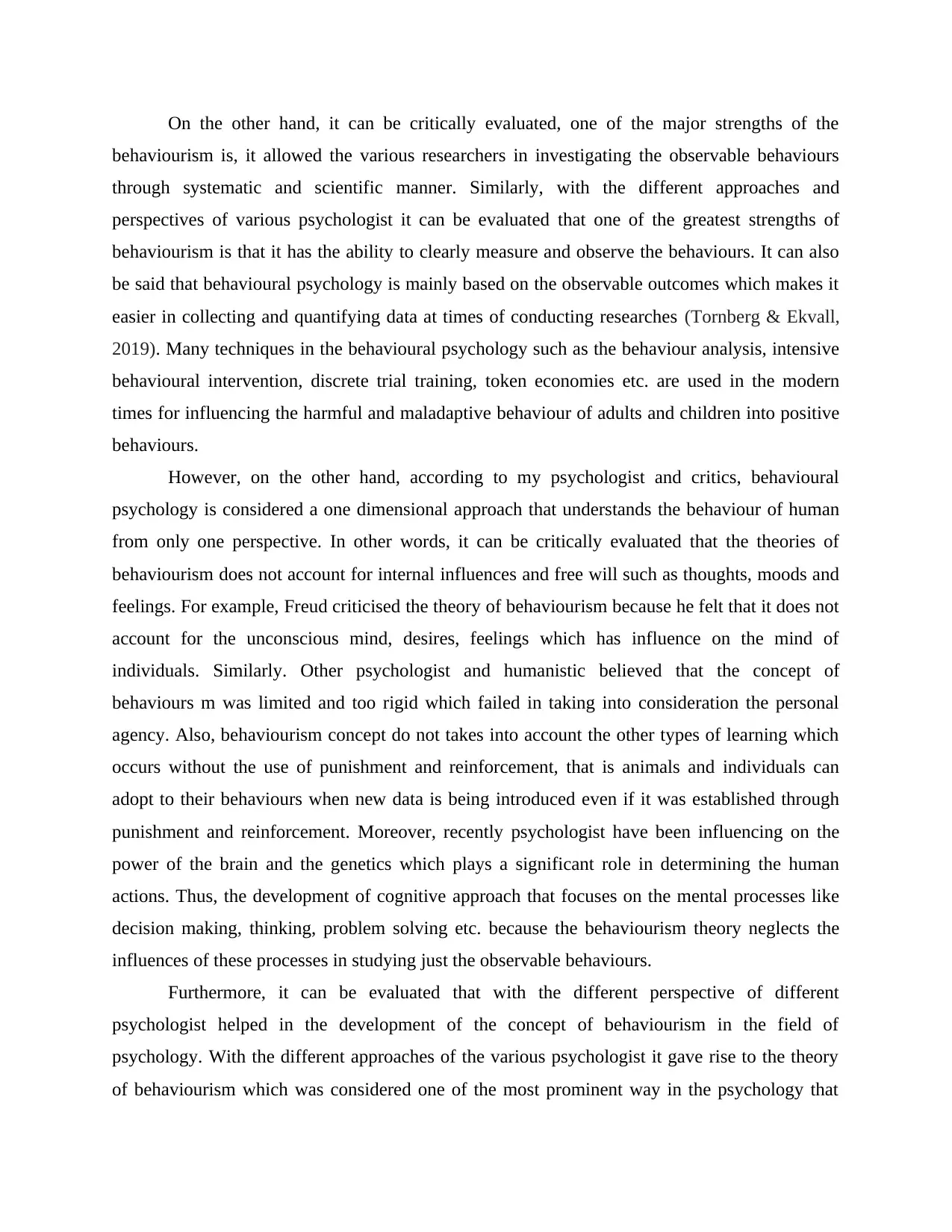
On the other hand, it can be critically evaluated, one of the major strengths of the
behaviourism is, it allowed the various researchers in investigating the observable behaviours
through systematic and scientific manner. Similarly, with the different approaches and
perspectives of various psychologist it can be evaluated that one of the greatest strengths of
behaviourism is that it has the ability to clearly measure and observe the behaviours. It can also
be said that behavioural psychology is mainly based on the observable outcomes which makes it
easier in collecting and quantifying data at times of conducting researches (Tornberg & Ekvall,
2019). Many techniques in the behavioural psychology such as the behaviour analysis, intensive
behavioural intervention, discrete trial training, token economies etc. are used in the modern
times for influencing the harmful and maladaptive behaviour of adults and children into positive
behaviours.
However, on the other hand, according to my psychologist and critics, behavioural
psychology is considered a one dimensional approach that understands the behaviour of human
from only one perspective. In other words, it can be critically evaluated that the theories of
behaviourism does not account for internal influences and free will such as thoughts, moods and
feelings. For example, Freud criticised the theory of behaviourism because he felt that it does not
account for the unconscious mind, desires, feelings which has influence on the mind of
individuals. Similarly. Other psychologist and humanistic believed that the concept of
behaviours m was limited and too rigid which failed in taking into consideration the personal
agency. Also, behaviourism concept do not takes into account the other types of learning which
occurs without the use of punishment and reinforcement, that is animals and individuals can
adopt to their behaviours when new data is being introduced even if it was established through
punishment and reinforcement. Moreover, recently psychologist have been influencing on the
power of the brain and the genetics which plays a significant role in determining the human
actions. Thus, the development of cognitive approach that focuses on the mental processes like
decision making, thinking, problem solving etc. because the behaviourism theory neglects the
influences of these processes in studying just the observable behaviours.
Furthermore, it can be evaluated that with the different perspective of different
psychologist helped in the development of the concept of behaviourism in the field of
psychology. With the different approaches of the various psychologist it gave rise to the theory
of behaviourism which was considered one of the most prominent way in the psychology that
behaviourism is, it allowed the various researchers in investigating the observable behaviours
through systematic and scientific manner. Similarly, with the different approaches and
perspectives of various psychologist it can be evaluated that one of the greatest strengths of
behaviourism is that it has the ability to clearly measure and observe the behaviours. It can also
be said that behavioural psychology is mainly based on the observable outcomes which makes it
easier in collecting and quantifying data at times of conducting researches (Tornberg & Ekvall,
2019). Many techniques in the behavioural psychology such as the behaviour analysis, intensive
behavioural intervention, discrete trial training, token economies etc. are used in the modern
times for influencing the harmful and maladaptive behaviour of adults and children into positive
behaviours.
However, on the other hand, according to my psychologist and critics, behavioural
psychology is considered a one dimensional approach that understands the behaviour of human
from only one perspective. In other words, it can be critically evaluated that the theories of
behaviourism does not account for internal influences and free will such as thoughts, moods and
feelings. For example, Freud criticised the theory of behaviourism because he felt that it does not
account for the unconscious mind, desires, feelings which has influence on the mind of
individuals. Similarly. Other psychologist and humanistic believed that the concept of
behaviours m was limited and too rigid which failed in taking into consideration the personal
agency. Also, behaviourism concept do not takes into account the other types of learning which
occurs without the use of punishment and reinforcement, that is animals and individuals can
adopt to their behaviours when new data is being introduced even if it was established through
punishment and reinforcement. Moreover, recently psychologist have been influencing on the
power of the brain and the genetics which plays a significant role in determining the human
actions. Thus, the development of cognitive approach that focuses on the mental processes like
decision making, thinking, problem solving etc. because the behaviourism theory neglects the
influences of these processes in studying just the observable behaviours.
Furthermore, it can be evaluated that with the different perspective of different
psychologist helped in the development of the concept of behaviourism in the field of
psychology. With the different approaches of the various psychologist it gave rise to the theory
of behaviourism which was considered one of the most prominent way in the psychology that
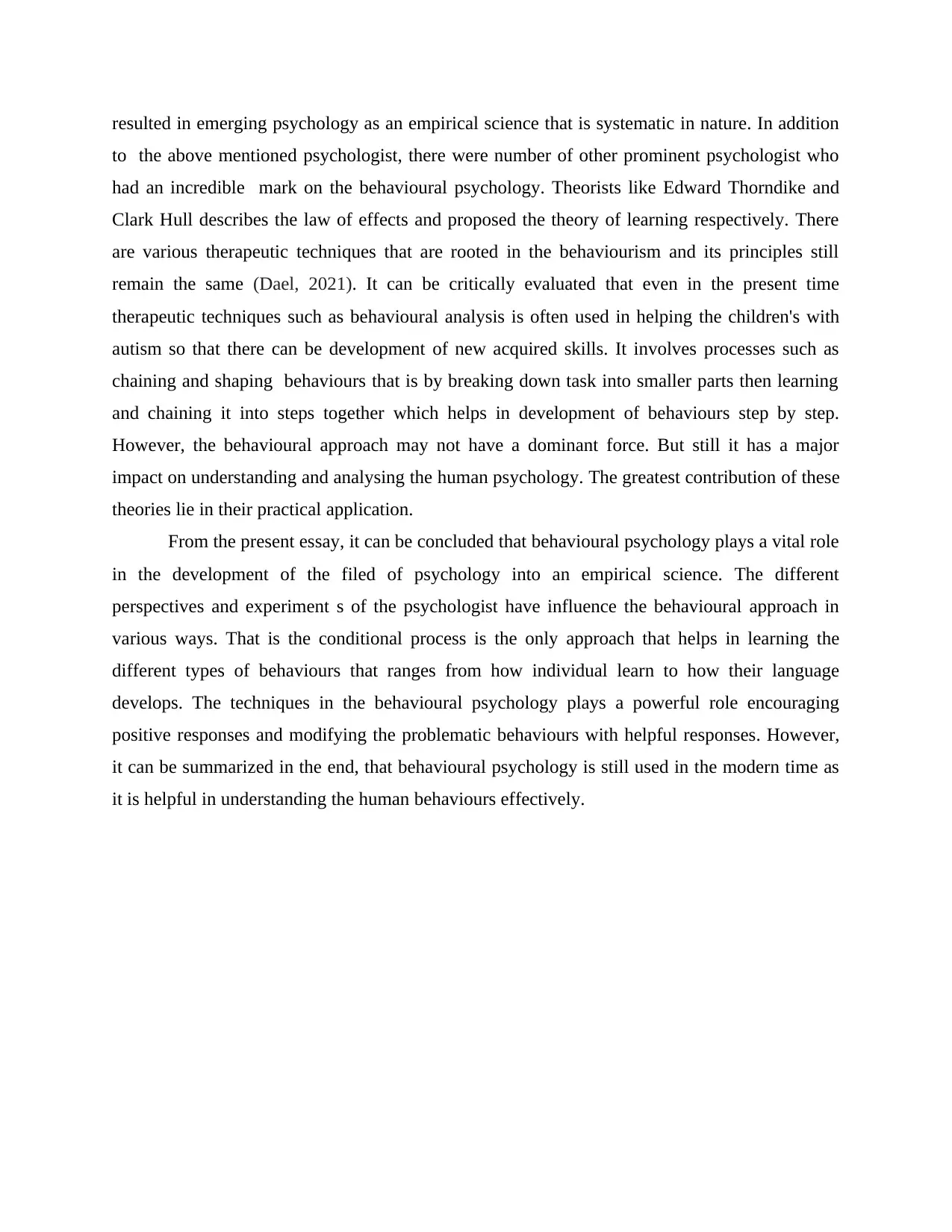
resulted in emerging psychology as an empirical science that is systematic in nature. In addition
to the above mentioned psychologist, there were number of other prominent psychologist who
had an incredible mark on the behavioural psychology. Theorists like Edward Thorndike and
Clark Hull describes the law of effects and proposed the theory of learning respectively. There
are various therapeutic techniques that are rooted in the behaviourism and its principles still
remain the same (Dael, 2021). It can be critically evaluated that even in the present time
therapeutic techniques such as behavioural analysis is often used in helping the children's with
autism so that there can be development of new acquired skills. It involves processes such as
chaining and shaping behaviours that is by breaking down task into smaller parts then learning
and chaining it into steps together which helps in development of behaviours step by step.
However, the behavioural approach may not have a dominant force. But still it has a major
impact on understanding and analysing the human psychology. The greatest contribution of these
theories lie in their practical application.
From the present essay, it can be concluded that behavioural psychology plays a vital role
in the development of the filed of psychology into an empirical science. The different
perspectives and experiment s of the psychologist have influence the behavioural approach in
various ways. That is the conditional process is the only approach that helps in learning the
different types of behaviours that ranges from how individual learn to how their language
develops. The techniques in the behavioural psychology plays a powerful role encouraging
positive responses and modifying the problematic behaviours with helpful responses. However,
it can be summarized in the end, that behavioural psychology is still used in the modern time as
it is helpful in understanding the human behaviours effectively.
to the above mentioned psychologist, there were number of other prominent psychologist who
had an incredible mark on the behavioural psychology. Theorists like Edward Thorndike and
Clark Hull describes the law of effects and proposed the theory of learning respectively. There
are various therapeutic techniques that are rooted in the behaviourism and its principles still
remain the same (Dael, 2021). It can be critically evaluated that even in the present time
therapeutic techniques such as behavioural analysis is often used in helping the children's with
autism so that there can be development of new acquired skills. It involves processes such as
chaining and shaping behaviours that is by breaking down task into smaller parts then learning
and chaining it into steps together which helps in development of behaviours step by step.
However, the behavioural approach may not have a dominant force. But still it has a major
impact on understanding and analysing the human psychology. The greatest contribution of these
theories lie in their practical application.
From the present essay, it can be concluded that behavioural psychology plays a vital role
in the development of the filed of psychology into an empirical science. The different
perspectives and experiment s of the psychologist have influence the behavioural approach in
various ways. That is the conditional process is the only approach that helps in learning the
different types of behaviours that ranges from how individual learn to how their language
develops. The techniques in the behavioural psychology plays a powerful role encouraging
positive responses and modifying the problematic behaviours with helpful responses. However,
it can be summarized in the end, that behavioural psychology is still used in the modern time as
it is helpful in understanding the human behaviours effectively.
⊘ This is a preview!⊘
Do you want full access?
Subscribe today to unlock all pages.

Trusted by 1+ million students worldwide
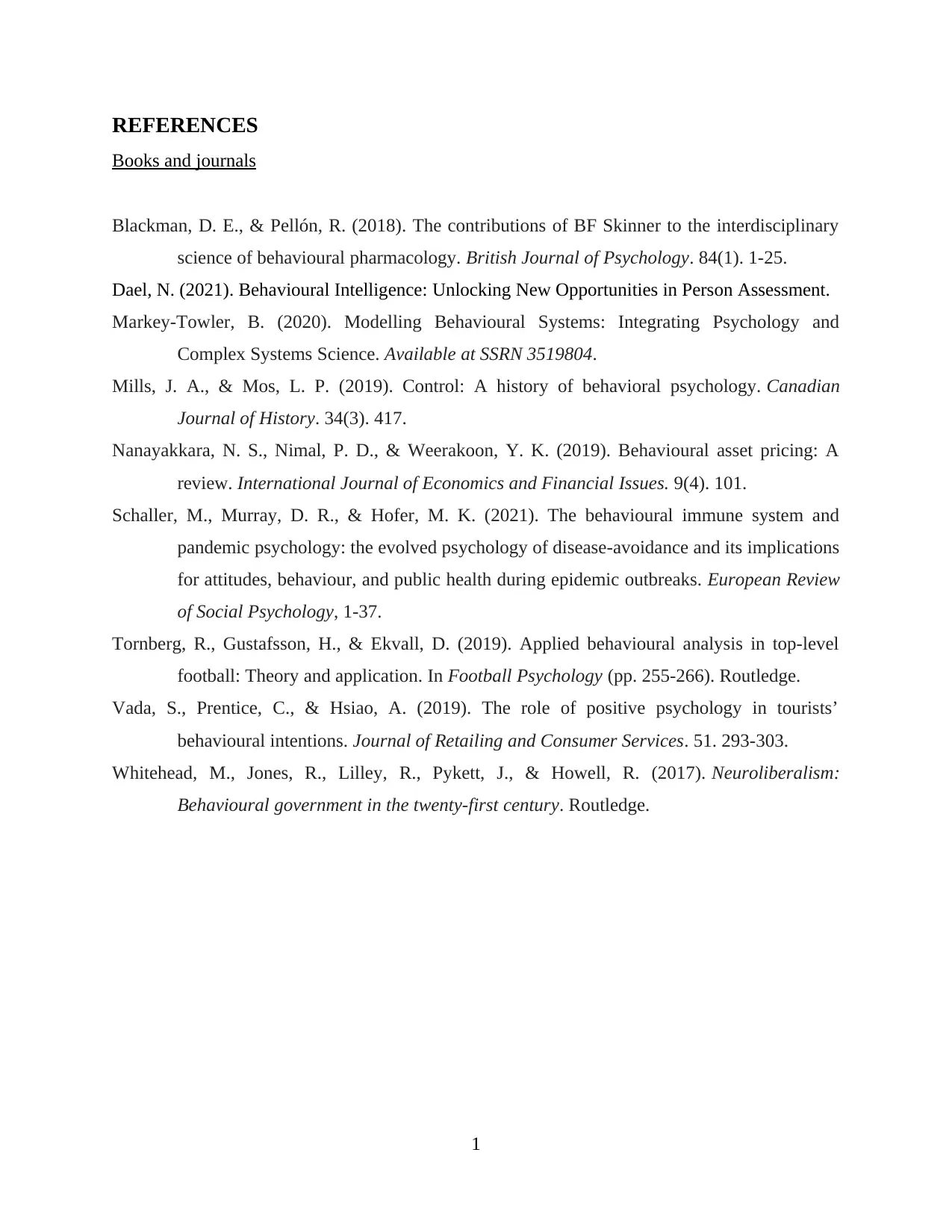
REFERENCES
Books and journals
Blackman, D. E., & Pellón, R. (2018). The contributions of BF Skinner to the interdisciplinary
science of behavioural pharmacology. British Journal of Psychology. 84(1). 1-25.
Dael, N. (2021). Behavioural Intelligence: Unlocking New Opportunities in Person Assessment.
Markey‐Towler, B. (2020). Modelling Behavioural Systems: Integrating Psychology and
Complex Systems Science. Available at SSRN 3519804.
Mills, J. A., & Mos, L. P. (2019). Control: A history of behavioral psychology. Canadian
Journal of History. 34(3). 417.
Nanayakkara, N. S., Nimal, P. D., & Weerakoon, Y. K. (2019). Behavioural asset pricing: A
review. International Journal of Economics and Financial Issues. 9(4). 101.
Schaller, M., Murray, D. R., & Hofer, M. K. (2021). The behavioural immune system and
pandemic psychology: the evolved psychology of disease-avoidance and its implications
for attitudes, behaviour, and public health during epidemic outbreaks. European Review
of Social Psychology, 1-37.
Tornberg, R., Gustafsson, H., & Ekvall, D. (2019). Applied behavioural analysis in top-level
football: Theory and application. In Football Psychology (pp. 255-266). Routledge.
Vada, S., Prentice, C., & Hsiao, A. (2019). The role of positive psychology in tourists’
behavioural intentions. Journal of Retailing and Consumer Services. 51. 293-303.
Whitehead, M., Jones, R., Lilley, R., Pykett, J., & Howell, R. (2017). Neuroliberalism:
Behavioural government in the twenty-first century. Routledge.
1
Books and journals
Blackman, D. E., & Pellón, R. (2018). The contributions of BF Skinner to the interdisciplinary
science of behavioural pharmacology. British Journal of Psychology. 84(1). 1-25.
Dael, N. (2021). Behavioural Intelligence: Unlocking New Opportunities in Person Assessment.
Markey‐Towler, B. (2020). Modelling Behavioural Systems: Integrating Psychology and
Complex Systems Science. Available at SSRN 3519804.
Mills, J. A., & Mos, L. P. (2019). Control: A history of behavioral psychology. Canadian
Journal of History. 34(3). 417.
Nanayakkara, N. S., Nimal, P. D., & Weerakoon, Y. K. (2019). Behavioural asset pricing: A
review. International Journal of Economics and Financial Issues. 9(4). 101.
Schaller, M., Murray, D. R., & Hofer, M. K. (2021). The behavioural immune system and
pandemic psychology: the evolved psychology of disease-avoidance and its implications
for attitudes, behaviour, and public health during epidemic outbreaks. European Review
of Social Psychology, 1-37.
Tornberg, R., Gustafsson, H., & Ekvall, D. (2019). Applied behavioural analysis in top-level
football: Theory and application. In Football Psychology (pp. 255-266). Routledge.
Vada, S., Prentice, C., & Hsiao, A. (2019). The role of positive psychology in tourists’
behavioural intentions. Journal of Retailing and Consumer Services. 51. 293-303.
Whitehead, M., Jones, R., Lilley, R., Pykett, J., & Howell, R. (2017). Neuroliberalism:
Behavioural government in the twenty-first century. Routledge.
1
1 out of 7
Related Documents
Your All-in-One AI-Powered Toolkit for Academic Success.
+13062052269
info@desklib.com
Available 24*7 on WhatsApp / Email
![[object Object]](/_next/static/media/star-bottom.7253800d.svg)
Unlock your academic potential
Copyright © 2020–2026 A2Z Services. All Rights Reserved. Developed and managed by ZUCOL.





